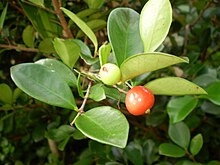Eugenia reinwardtiana
| Eugenia reinwardtiana | |
|---|---|

| |
| Scientific classification | |
| Kingdom: | Plantae |
| Clade: | Tracheophytes |
| Clade: | Angiosperms |
| Clade: | Eudicots |
| Clade: | Rosids |
| Order: | Myrtales |
| Family: | Myrtaceae |
| Genus: | Eugenia |
| Species: | E. reinwardtiana
|
| Binomial name | |
| Eugenia reinwardtiana | |
| Synonyms[1] | |
|
show
List | |
Eugenia reinwardtiana (Chamorro: a'abang) is a shrub to small tree in the family Myrtaceae, (Native to tropical forests in northern Queensland, Australia; Indonesia,[2] and the Pacific Islands). Also known as the Cedar Bay cherry. Other common names includes; Beach Cherry, Australian Beach, Mountain Stopper,[3][4] and Nioi (Hawaii).[5] They are typically 2 to 6 m (6.6 to 19.7 ft) in height.[6]
The tree is particularly common around the Cedar Bay National Park in northern Australia and the edible fruit was especially popular with the hippies who lived there in the 1970s.
The fruits are green at first, when ripe it turns to a bright orange-red colour, these fruits are also taste sweet and delicious with its soft flesh.[3]
Uses[]
The tree is cultivated to a limited extent for its edible sweetish fruit that is often eaten out-of-hand, used to flavour drinks and candies, or as a preserve. The fruit is a source of antioxidants.[7]
The tree is well-suited to amenity horticulture in the tropics, and is grown in the median strips in Cairns. It is readily propagated from fresh seed.[6]
This species is susceptible to Myrtle Rust (Puccinia psidii).[3]
References[]
- ^ "The Plant List: A Working List of All Plant Species". Retrieved February 5, 2014.
- ^ "Eugenia reinwardtiana". Germplasm Resources Information Network (GRIN). Agricultural Research Service (ARS), United States Department of Agriculture (USDA). Retrieved 2009-11-10.
- ^ Jump up to: a b c "Cedar Bay Cherry - Eugenia reinwardtiana". www.daleysfruit.com.au. Retrieved 2020-01-10.
- ^ "Eugenia reinwardtiana (Blume) DC". PLANTS Database. United States Department of Agriculture. Retrieved 2009-11-10.
- ^ "nioi". Hawaiian Ethnobotany Online Database. Bernice P. Bishop Museum. Archived from the original on 2008-03-28. Retrieved 2009-11-10.
- ^ Jump up to: a b Wrigley, J.W., Fagg, M., Australian Native Plants, Collins, 1986, ISBN 0-00-216575-9
- ^ Sullivan, Rachel (30 April 2009). "Rainforest Fruit Power". Australian Broadcasting Corporation.
External links[]
![]() Media related to Eugenia reinwardtiana at Wikimedia Commons
Media related to Eugenia reinwardtiana at Wikimedia Commons
![]() Data related to Eugenia reinwardtiana at Wikispecies
Data related to Eugenia reinwardtiana at Wikispecies
- Eugenia
- Plants described in 1828
- Bushfood
- Flora of Malesia
- Flora of New Guinea
- Flora of Oceania
- Flora of the Northern Mariana Islands
- Flora of Guam
- Flora of Queensland
- Flora of the Pacific
- Edible fruits
- Eugenia stubs